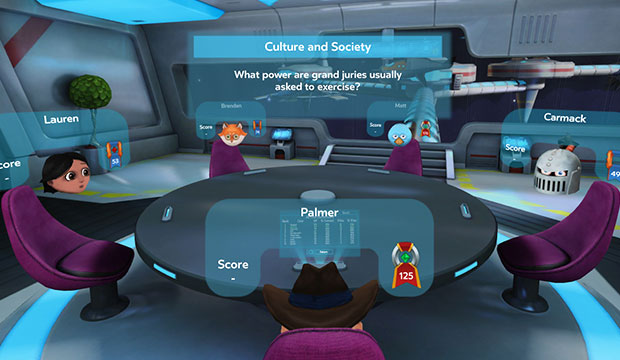Oculus VR this week launched Oculus Social for Samsung’s Gear VR viewer.
Gear VR users can create profiles on Oculus Social and search out friends via real names or handles.
The company, which has yet to ship its own virtual reality headset, also released two social games to encourage more friending on Oculus Social: Herobound: Gladiators and Social Trivia.
In Herobound: Gladiators, players team up to take arms in a clash between demons and goblins in the fighting pits of arena battlefields. Social Trivia sits friends down at a virtual table and pits their wits against each other in a classic game of know-it-all.
Oculus Social also has been upgraded to allow users to create rooms in which they can hang out with friends in the virtual space, watching content such as Twitch streams or Facebook videos.
The team deployed a Facebook Video tab in Oculus Social. Next week, the company will give users the ability to sync their Facebook and Oculus Social profiles so that they can personalize their feeds of 360 video content.
Weeks from now, Oculus Social will support the liking and sharing of Facebook 360 videos.
Social Society
Parent company Facebook has been planning to use Oculus Social to change the inherently exclusionary nature of VR, according to Charles King, principal analyst for Pund-IT.
“First, the company indicated that Oculus users will be able to share space in VR, interacting socially, chatting, watching films and competing in trivia games,” he told TechNewsWorld. “Second, the company announced a multiplayer game service that appears to make use of some social features, though details on that appear sketchy.”
Social experiences might be what VR needs to establish itself firmly in the mainstream. It can be difficult to sell VR experience via the flat screens and 2D images the world has known for decades.
VR is definitely a new era, said Stephanie Llamas, VR lead atSuperData.
The firm recently updated its forecast for VR and found that experiences like the ones Gear VR provides will bring in US$1.8 billion in revenue from hardware and software sales by the end of next year. The mobile VR market will swell to roughly $4.5 billion the year after that.
“Rather than consider it a hardware peripheral, we should be looking at it as a standalone hardware device just like TV or computers,” Llamas told TechNewsWorld. “This is the beginning of a completely new way to consume media — at least once adoption reaches critical mass.”
Sewn Together
VR’s progression appears to be more of a continuation of current trends than a fork in the road, Pund-IT’s King said.
“Virtual reality technology has been around in one form or another for the better part of three decades, and much of what Facebook and Oculus are doing is derivative of those past efforts,” he said. “But multiplayer online gaming and immersive social experiences also have a lengthy history.”
Multiplayer games have long allowed players to communicate with one another to discuss strategy, King reasoned. In the case of immersive social experiences, the industry saw that take off with the launch of Second Life more than a decade ago.
“With Oculus Social, Facebook appears to be taking some pages from these past efforts and spinning them with a VR slant,” he said. “It’ll be interesting to see what the company comes up with that’s actually new, and whether it can avoid the pitfalls and mistakes that tripped up others.”




















































